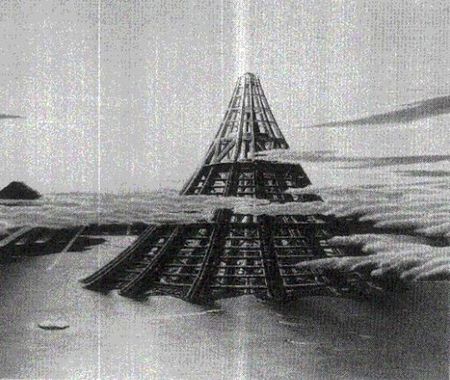TallBuildings: Difference between revisions
Dave Young (talk | contribs) No edit summary |
Dave Young (talk | contribs) |
||
| Line 3: | Line 3: | ||
===Is There a Limit to How Tall Buildings Can Get?=== | ===Is There a Limit to How Tall Buildings Can Get?=== | ||
[[File:xseed4000.jpg | thumb | upright=1 | "A 1990s-era concept for a two-and-a-half-mile volcano-looking supertower in Tokyo called the X-Seed 4000"]] | [[File:xseed4000.jpg | thumb | upright=1.5 | "A 1990s-era concept for a two-and-a-half-mile volcano-looking supertower in Tokyo called the X-Seed 4000"]] | ||
''"The race is always on. Within the span of just two years, the world's tallest building was built three times in New York City – the 282.5-meter Bank of Manhattan in 1930, the 319-meter Chrysler Building in a few months after, and then 11 months later the 381-meter Empire State Building in 1931. The era of architectural horse-racing and ego-boosting has only intensified in the decades since. In 2003, the 509-meter Taipei 101 unseated the 452-meter Petronas Towers in Kuala Lumpur after a seven-year reign as the world's tallest. In 2010, the Burj Khalifa in Dubai far surpassed Taipei 101, climbing up to 828 meters. Bold builders in China want to go 10 meters higher later this year with a 220-story pre-fab tower that can be constructed in a baffling 90 days. And then, in 2018, the Kingdom Tower in Jeddah, Saudi Arabia (below, right) will go significantly farther, with a proposed height of at least 1,000 meters."'' | ''"The race is always on. Within the span of just two years, the world's tallest building was built three times in New York City – the 282.5-meter Bank of Manhattan in 1930, the 319-meter Chrysler Building in a few months after, and then 11 months later the 381-meter Empire State Building in 1931. The era of architectural horse-racing and ego-boosting has only intensified in the decades since. In 2003, the 509-meter Taipei 101 unseated the 452-meter Petronas Towers in Kuala Lumpur after a seven-year reign as the world's tallest. In 2010, the Burj Khalifa in Dubai far surpassed Taipei 101, climbing up to 828 meters. Bold builders in China want to go 10 meters higher later this year with a 220-story pre-fab tower that can be constructed in a baffling 90 days. And then, in 2018, the Kingdom Tower in Jeddah, Saudi Arabia (below, right) will go significantly farther, with a proposed height of at least 1,000 meters."'' | ||
Revision as of 15:35, 19 September 2012
Research notes about Architecture
Collected notes/links about buildings/constructions and systems required to design them.
Is There a Limit to How Tall Buildings Can Get?
"The race is always on. Within the span of just two years, the world's tallest building was built three times in New York City – the 282.5-meter Bank of Manhattan in 1930, the 319-meter Chrysler Building in a few months after, and then 11 months later the 381-meter Empire State Building in 1931. The era of architectural horse-racing and ego-boosting has only intensified in the decades since. In 2003, the 509-meter Taipei 101 unseated the 452-meter Petronas Towers in Kuala Lumpur after a seven-year reign as the world's tallest. In 2010, the Burj Khalifa in Dubai far surpassed Taipei 101, climbing up to 828 meters. Bold builders in China want to go 10 meters higher later this year with a 220-story pre-fab tower that can be constructed in a baffling 90 days. And then, in 2018, the Kingdom Tower in Jeddah, Saudi Arabia (below, right) will go significantly farther, with a proposed height of at least 1,000 meters."
____________________________________________________
What affects skyscraper construction?
- Materials
- Human comfort
- Elevator technology
- Capital
____________________________________________________
"What do you think is the single biggest limiting factor that would prevent humanity creating a mile-high tower or higher?"
Video interview with architects on the subject here
____________________________________________________
William Baker - Structural Engineer on Burj Khalifa
Buttressed core method
source: http://www.theatlanticcities.com/design/2012/08/there-limit-how-tall-buildings-can-get/2963/

